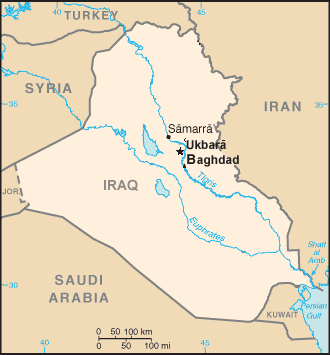Ukbara

This article includes a list of general references, but it lacks sufficient corresponding inline citations. (February 2022) |
Ukbara (عكبرا) was a medieval city on the left bank of the Tigris between Samarra and Baghdad. The Tigris has changed course since, and its ruins now lie some distance from the river.
History
It was refounded by the
Famous native sons include:
- the great Islamic grammarian, philologist, and religious scholar Abul-Baqa Al-Ukbari (ca. 1143-1219), author of some 60 works, many of them recently reprinted;
- Ibn Makula, author of an early dictionary of names, born Sha'ban 5, 421 AH
- Sheikh al-Mufid[1]
- two notable early Meshwi al-Ukbari[3].
It is described in many Arabic geographical works, beginning with the famous 9th-century geography of
- it was on the postal road from Samarra to Baghdad, nine stages from Samarra and six from Baghdad;
- it was on the road from Baghdad to Mosul, 9 parasangs from Baghdad (5 from the previous stop, al-Bardan, and 3 from the next, Bahimsha);
- it was on the westward road from Baghdad, 4 stages from al-Bardan (6 from Baghdad) and 7 from the next stop, Samarra.
(The seeming contradiction between points 1 and 3 is found in the text, as provided by http://www.alwaraq.com/ .)
However, the tenth-century
- وفي وجه سامرا مدينة عكبرا وهي كبيرة عامرة، كثيرة الفواكه جيدة الاعناب سرية
- And in front of Samarra is the town of Ukbara, which is large and populous, with abundant fruit and good grapes. (p. 42, al-Waraq online edition)
The twelfth-century geographer
The Jewish traveller Benjamin of Tudela (twelfth century) also mentions it, calling it "Okbara, the city which Jeconiah the King built, where there are about 10,000 Jews, and at their head are R. Chanan, R. Jabin and R. Ishmael."
The later Yaqut al-Hamawi (thirteenth century) goes into yet more detail, noting two alternate names, the "Arabized" form `Akburah and Buzurj-Sabur بزرج سابور, after the Persian name Vuzurg-Shapur mentioned above, calling it:
- بليدة من نواحي دُجيل قرب صريفين وأوَانا بينها وبين بغداد عشرة فراسخ، والنسبة إليها عكبري وعكبراوي، منها شيخنا إمام عصره محب الدين أبو البقاء عبد اللهَ بن الحسين النحوي العكبري مات في ربيع الأول سنة 616، وقرىء على سارية بجامع عكبرا:
- a little town in the area of Dujayl near Sarifin and Awana, 10 parasangs from Baghdad; its natives are called Ukbari or Ukbarawi, and include our Sheikh the Imam of his time, Muhibb ud-Din Abul-Baqa Abdallah ibn al-Husayn an-Nahwi al-Ukbari, who died in Rabi I, 616 AH.
and quotes two brief epigrams about the town.
The biographical dictionary of Ibn Khallikan (thirteenth century) calls it:
- وهي بليدة على دجلة فوق بغداد بعشرة فراسخ خرج منها جماعة من العلماء وغيرهم
- a little town on the Tigris, 10 parasangs above Baghdad, from which a group of learned men and their like have emerged.
See also
- Uqbar
References
- ISBN 978-0-521-24693-4.
Sources
- adh-Dhahabi, al-Ibar fi Khabar min al-Ghabar, al-Waraq edition[permanent dead link], p. 193.
- al-Muqaddasi, Ahsan ut-Taqasim fi Ma`rifati l-'Aqalim, Al-Waraq edition[permanent dead link], p. 42.
- Benjamin of Tudela, The Itinerary of Benjamin of Tudela, translated by Macus Nathan Adler, London 1907, p. 35.
- Ibn Khallikan, Wafayat ul-'A`yan, Al-Waraq edition[permanent dead link], p. 351.
- Ibn Khordadhbeh, al-Masalik wal-Mamalik, Al-Waraq edition[permanent dead link], pp. 14, 21, 56, 61.
- Kohler, Kaufmann and Samuel Poznanski, Jewish Encyclopedia article on Ishmael of Akbara
- W. Schott, "Ocbara" and "Ocbari", in ed. Johann Samuel Ersch, Johann Gottfried Gruber, Allgemeine Encyclopädie der Wissenschaften und Künste, Leipzig 1818.
- Singer, Isidore and Broydé, Isaac, Jewish Encyclopedia article on "Meshwi al-‘Ukbari"
- — the Jewish Encyclopedia article "Okbara and Okbarites" is simply a cross reference to their article "Meshwi al-‘Ukbari".
- Yaqut al-Hamawi, Mu'jam al-Buldan, Al-Waraq edition[permanent dead link], p. 1243
- ed. Ehsan Yarshater, The Cambridge History of Iran, vol. 3(2): The Seleucid, Parthian, and Sasanian Periods, NY: Cambridge UP, 1983, pp. 757–760.
External links
